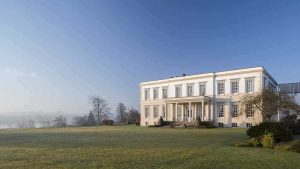Single Cell View 3D Genome Architecture
Organisers: Srinjan Basu, David Lando and Tim Stevens
Date: 26-29 November 2023
Location: Buxted Park, East Sussex, UK
The 3-dimensional (3D) folding of the genome sequence inside the eukaryotic nucleus is tightly linked to cell function and identity. For that reason, deciphering the rules that govern 3D genome architecture is currently an important challenge facing biology. Determining genome architecture at the level of looping DNA-to-DNA interactions and/or phase separated compartments will allow us to better investigate structure-function relationships. The potential benefits to both basic research and medicine are extensive as genome organisation is known to play important roles in various biological settings, such as those involving cellular differentiation during development and disease states like cancer.
The last few years has seen the development of a variety of new techniques that when combined with computational analysis/modelling is beginning to allow us to better scrutinise the importance of 3D genome structure and function in its native single-cell state. In parallel studies, single-cell analysis is now commonly used to measure gene transcription and epigenomic marks, like DNA methylation. An interesting outcome of these studies has been the level by which genome structure, transcription and epigenomic marks vary from cell to cell. An important area of investigation now is to try to understand to what level this variation is important in regulating biological function.
This Workshop will bring together a wide range of scientists with expertise in 3D genome architecture, single-cell biology, microscopy, biophysics and computational biology. The main purpose will be to discuss how molecular processes studied at a single-cell and single-molecule level can help our understanding of how genome folding affects biological function. Examples such as those involving promoter and enhancer loop contact during transcription, chromatin complex formation at silent and active genome regions and liquid-liquid phase separation will be discussed. Together we will identify key priorities the field needs to address to better realise the full potential of probing 3D nuclear architecture at the single-cell level.
By inviting scientists from a wide range of disciplines we believe this timely and exciting Workshop will foster new opportunities for research in this important area of biology.
Workshop topics:
- Methodological advances in probing genome architecture
- Stochastic variation in nuclear biology
- Genome folding and dynamics
- Consolidating single-cell approaches with genome architecture: challenges and opportunities
Organisers & speakers
Srinjan Basu Wellcome-MRC Cambridge Stem Cell Institute, UK
David Lando University of Cambridge, UK
Tim Stevens MRC Laboratory of Molecular Biology, UK
Wendy Bickmore University of Edinburgh, UK
Alistair Boettiger Stanford University, USA
Daphne Cabianca Institute of Functional Epigenetics, Helmholtz Munich, Germany
Jesse Dixon Salk Institute, USA
Eileen Furlong EMBL, Germany
Anton Goloborodko Institute of Molecular Biotechnology – OeAW, Austria
David Holcman École Normale Supérieure, France
Jop Kind Hubrecht Institute & Oncode Institute, The Netherlands
Melike Lakadamyali University of Pennsylvania, USA
Ernest Laue University of Cambridge, UK
Elisa Laurenti Wellcome Trust – MRC Cambridge Stem Cell Institute, UK
Clodagh C O’Shea Salk Institute, USA
Ana Pombo Max Delbruck Center for Molecular Medicine, Germany
Sofia Quinodoz Princeton University, USA
Vijay Ramani University of California, San Francisco/The Gladstone Institutes, USA
Wolf Reik Babraham Institute, UK
Peter Virnau University of Mainz, Germany
Early-career researchers
Applications for this Workshop have now closed
We offer 10 funded places for early-career researchers (PhD, postdocs and PIs in the first 3 years of their first appointment) to attend our Workshops along with the 20 invited speakers. We just ask that you pay for your own travel costs. Please complete the application form and attach a one page CV and an abstract. PhD and postdoc applicants should include a letter of support from their supervisor
All attendees are expected to actively contribute to the Workshops by asking questions at presentation sessions and taking part in discussions.
At some Workshops, early career scientists are given additional responsibilities to promote their involvement, such as:
- Write a daily blog for the Node
- Summarise the previous day’s themes to set the scene for the next day’s sessions
- Present a poster on their research interests
- Propose future directions and collaborations
- Give a short talk on their research
- Make a short 2 minute video on their experience at the Workshop
Most of these activities would be carried out in pairs or small groups and often with the
support of more senior scientists present.
About Buxted Park

The Workshop will be held at the beautiful Buxted Park in East Sussex which dates back to the 12th century. The current house was built in 1722 by Sir Thomas Medley and is an elegant Grade II Palladian mansion set in 312 acres of parkland. Over the years it has played host to a number of high profile visitors including William Wordsworth, Winston Churchill, and George V and Queen Mary. Whilst it was a health hydro in the 1960s Gregory Peck, Dudley Moore and Marlon Brando were regular visitors.
Buxted Park is less than 25 miles from Gatwick Airport and 60 miles from Heathrow Airport. There are direct trains taking 1 hour 10 minutes from London Bridge to the village of Buxted which is only a mile away from the hotel.
Buxted Park Hotel
Station Road
Buxted
East Sussex
TN22 4AY
Tel: +44 (0) 1825 733333








You must be logged in to post a comment.